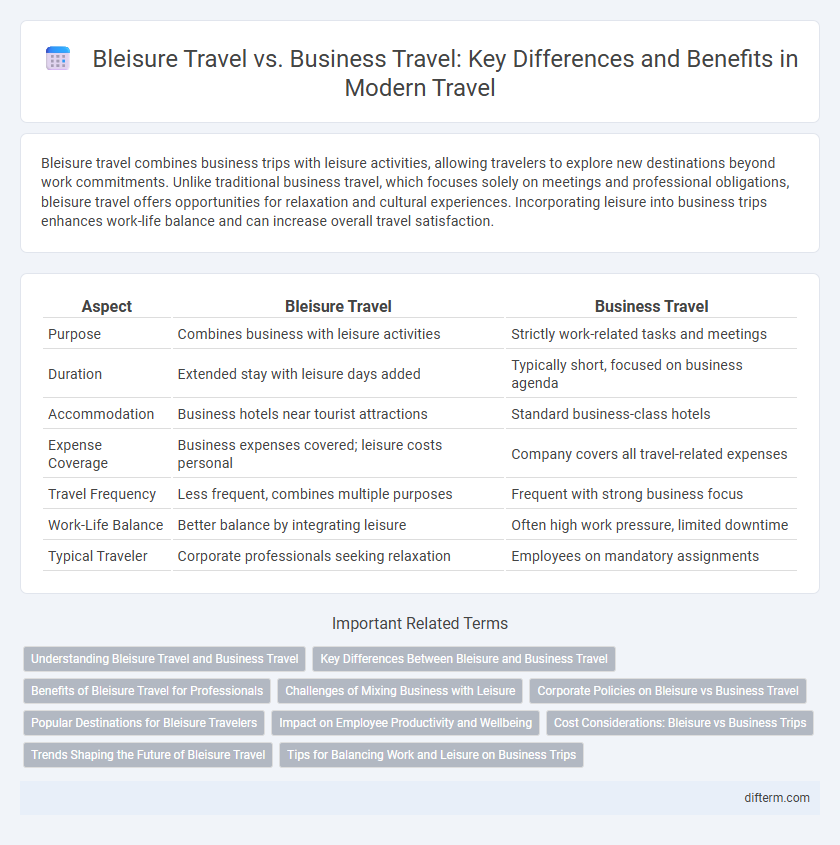Bleisure travel combines business trips with leisure activities, allowing travelers to explore new destinations beyond work commitments. Unlike traditional business travel, which focuses solely on meetings and professional obligations, bleisure travel offers opportunities for relaxation and cultural experiences. Incorporating leisure into business trips enhances work-life balance and can increase overall travel satisfaction.
Table of Comparison
| Aspect | Bleisure Travel | Business Travel |
|---|---|---|
| Purpose | Combines business with leisure activities | Strictly work-related tasks and meetings |
| Duration | Extended stay with leisure days added | Typically short, focused on business agenda |
| Accommodation | Business hotels near tourist attractions | Standard business-class hotels |
| Expense Coverage | Business expenses covered; leisure costs personal | Company covers all travel-related expenses |
| Travel Frequency | Less frequent, combines multiple purposes | Frequent with strong business focus |
| Work-Life Balance | Better balance by integrating leisure | Often high work pressure, limited downtime |
| Typical Traveler | Corporate professionals seeking relaxation | Employees on mandatory assignments |
Understanding Bleisure Travel and Business Travel
Bleisure travel combines business trips with leisure activities, allowing travelers to extend their stay for personal enjoyment. Business travel strictly focuses on work-related tasks, meetings, and conferences without leisure elements. Understanding this distinction helps companies optimize travel expenses while enhancing employee satisfaction.
Key Differences Between Bleisure and Business Travel
Bleisure travel combines business trips with leisure activities, allowing travelers to extend their stay beyond work commitments to explore local attractions and unwind. Business travel, by contrast, is focused solely on professional objectives such as meetings, conferences, and client visits, prioritizing efficiency and productivity. Key differences include the purpose of the trip, duration, activities planned, and traveler mindset, with bleisure offering a balanced blend of work and recreation while business travel remains strictly task-oriented.
Benefits of Bleisure Travel for Professionals
Bleisure travel combines business trips with leisure activities, enhancing work-life balance and reducing stress for professionals. This type of travel encourages cultural exploration and personal enrichment while maintaining productivity. Companies benefit from improved employee satisfaction and retention when supporting bleisure travel opportunities.
Challenges of Mixing Business with Leisure
Balancing productivity and relaxation presents significant challenges in bleisure travel, often leading to blurred boundaries that can reduce work efficiency and personal downtime. Travel fatigue and limited access to business resources complicate the integration of leisure activities during business trips. Maintaining professionalism while seeking enjoyment requires careful planning to avoid conflicts between work commitments and personal experiences.
Corporate Policies on Bleisure vs Business Travel
Corporate policies on bleisure travel often emphasize clear boundaries between personal and business expenses to ensure compliance with tax regulations and company reimbursement rules. Business travel policies typically mandate prior approval and detailed documentation for all expenses, whereas bleisure travel guidelines may require employees to separately account for personal days and adjust expense claims accordingly. Employers increasingly implement specific clauses to mitigate liability and control costs while promoting employee work-life balance through regulated bleisure opportunities.
Popular Destinations for Bleisure Travelers
Popular destinations for bleisure travelers often include vibrant cities like Barcelona, Tokyo, and New York, where rich cultural experiences blend seamlessly with business opportunities. These locations offer diverse attractions, ranging from historic landmarks to world-class dining, attracting professionals who extend their trips for leisure. Access to quality accommodations and connectivity also play a crucial role in making these cities top choices for combining work and leisure travel.
Impact on Employee Productivity and Wellbeing
Bleisure travel blends business with leisure, enhancing employee productivity by reducing burnout and improving overall job satisfaction through breaks and personal exploration. Traditional business travel often prioritizes work tasks, leading to increased stress and fatigue, which can negatively affect performance and mental health. Incorporating leisure elements during business trips supports better work-life balance, resulting in improved wellbeing and sustained employee engagement.
Cost Considerations: Bleisure vs Business Trips
Bleisure travel often reduces overall expenses by combining business commitments with leisure activities, allowing travelers to extend their stay at minimal additional cost. In contrast, business trips strictly focus on work-related expenditures, frequently leading to higher costs from shorter stays and premium last-minute bookings. Companies may encounter budget variances since bleisure trips blend personal and professional expenses, requiring clear policies to manage cost allocations effectively.
Trends Shaping the Future of Bleisure Travel
Bleisure travel is rapidly evolving as a significant trend, with 60% of business travelers combining leisure activities with work trips, driven by flexible remote work policies and digital nomadism. Key trends shaping the future of bleisure travel include the rise of sustainable accommodations, increased demand for wellness-focused experiences, and the integration of advanced travel technology like AI-driven itinerary planning. Major travel brands are investing in customizable packages that blend productivity and leisure, catering to employees seeking work-life balance during corporate travel.
Tips for Balancing Work and Leisure on Business Trips
Balancing work and leisure on business trips requires strategic planning to maximize productivity and relaxation. Prioritize essential meetings and allocate free time for exploring local attractions or enjoying cultural experiences, ensuring a healthy work-life balance. Utilize tools such as travel apps for efficient scheduling and choose accommodations near both business venues and leisure spots to minimize transit time.
Bleisure travel vs Business travel Infographic

 difterm.com
difterm.com